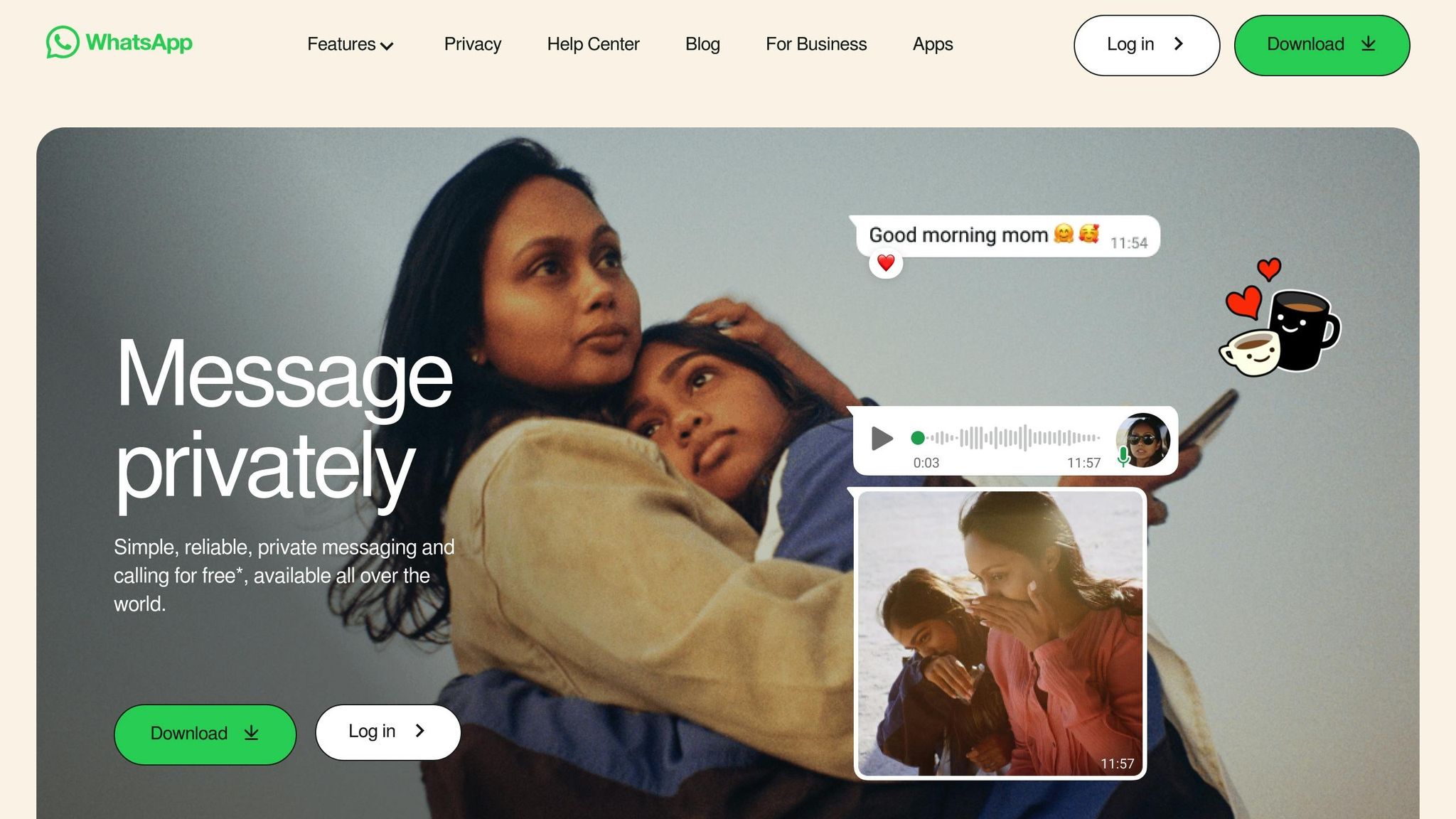Managing subcontractor approvals can be tricky, especially with remote teams. Here’s why WhatsApp is becoming a popular solution:
- Ease of Use: With over 2 billion users globally, WhatsApp is simple and familiar, even for non-tech-savvy subcontractors.
- Real-Time Updates: Subcontractors can share photos, videos, or updates instantly, even in areas with poor internet.
- Legal Recognition: Courts have upheld WhatsApp messages as binding agreements in some cases.
- Challenges: Compliance, record-keeping, and security concerns can arise when using WhatsApp for business.
- Solution: Tools like Workproofs.com enhance WhatsApp by adding structured workflows, automatic documentation, and compliance features.
Key Takeaway: WhatsApp is a practical tool for quick approvals, but pairing it with additional tools can address compliance and documentation gaps.
How WhatsApp Simplifies Remote Subcontractor Workflows

WhatsApp makes managing remote subcontractors easier with its user-friendly interface that requires no steep learning curve.
Real-Time Communication and Proof-of-Work Submission
With WhatsApp, subcontractors can quickly share proof of their work. Whether it’s photos, videos, or documents, they can send updates directly from their smartphones. Managers, in turn, can use pre-filled templates to speed up the review process.
The app’s multimedia capabilities shine when it comes to visual submissions. For example, construction workers can send images of completed tasks, logistics teams can share delivery confirmations, and designers can submit mockups for approval. This instant exchange of information helps kickstart an efficient feedback loop.
Approval and Feedback Process
WhatsApp’s conversational setup naturally supports a smooth feedback process between managers and subcontractors. Managers can respond with voice notes, quick emojis like a thumbs-up, or even annotated images, making communication clear and immediate.
The app’s instant notifications and quick-reply features ensure feedback is timely, keeping the work context fresh. A simple gesture like addressing subcontractors by name or recognizing their individual efforts can create a more collaborative and motivated team environment. This often results in higher-quality submissions and better alignment with project goals.
Legal Validity of WhatsApp-Based Approvals
WhatsApp is not just a practical tool for workflows - it can also serve as a legally recognized communication platform.
For instance, courts have upheld WhatsApp messages as legally binding agreements in certain cases. In Jaevee Homes Ltd v Fincham (t/a Fincham Demolition) [undefined] EWHC 1134 (TCC), WhatsApp messages were deemed sufficient to form a valid demolition contract, even without a formal subcontract, because the parties had agreed on key terms and intended to be legally bound. Similarly, in Achter Land & Cattle Ltd v South West Terminal Ltd, 2024 SKCA 115, a thumbs-up emoji was ruled as a valid agreement due to the context of prior informal communications.
"Businesses should exercise caution when negotiating via messaging platforms, as informal communications may have legal consequences." - DWF Group
To safeguard against legal risks, proper documentation is essential. Experts advise marking communications as “Subject to Contract” during negotiations and maintaining a clear record of all exchanges.
For organizations concerned about compliance, there are several strategies to ensure WhatsApp approvals meet legal and regulatory standards:
| Measure | Description |
|---|---|
| Enterprise Messaging Solutions | Provides compliance features like message archiving, monitoring, and audit trails. |
| Third-Party Archiving Solutions | Specializes in storing WhatsApp messages for audits and future reference. |
| Clear Communication Policies | Sets rules for using WhatsApp and ensures employees understand compliance obligations. |
| Regular Compliance Audits | Monitors practices to identify and address compliance gaps proactively. |
The importance of these measures is underscored by regulatory actions, such as the SEC fining 26 firms for failing to retain communications. Companies using WhatsApp should implement systems that automatically archive conversations, making them easily accessible for compliance reviews. Additionally, disabling disappearing messages ensures that all approvals and related discussions remain available for legal or audit purposes.
Benefits and Challenges of Using WhatsApp for Approvals
WhatsApp has become a go-to tool for streamlining subcontractor approvals. While it offers undeniable advantages, it also comes with challenges that organizations must weigh carefully.
Benefits: Speed, Accessibility, and Ease of Use
One of WhatsApp's standout features is its universal accessibility. With over 100 billion messages exchanged daily, it eliminates the need for complicated software setups or training sessions. In fact, about 70% of professionals use WhatsApp daily for work, making it an obvious choice for business communication.
The platform’s 98% open rate means messages are almost always seen, helping to avoid delays in time-sensitive approvals. Subcontractors can instantly share visual proof of work through photos or videos, while managers can quickly respond with voice notes, annotated images, or even emojis. This real-time interaction keeps projects moving efficiently.
WhatsApp’s intuitive interface is another major plus. Unlike specialized project management tools that often require onboarding, most users are already familiar with the app. For businesses, WhatsApp Business adds extra functionality, such as automated responses and business profiles, all while retaining the same user-friendly design. With over 576 million daily active users in 2024, it’s clear that the platform is widely embraced.
However, integrating WhatsApp into formal workflows isn’t without its risks.
Challenges: Compliance, Record-Keeping, and Security
While WhatsApp offers convenience, it also introduces serious challenges, especially in business settings. One of the biggest issues is record-keeping. WhatsApp's end-to-end encryption and features like disappearing messages can conflict with regulatory requirements for maintaining communication logs. This lack of oversight can lead to misconduct and makes creating audit trails difficult.
Compliance violations carry hefty consequences. For example, 16 Wall Street banks and financial institutions were fined nearly $2 billion for improper use of WhatsApp and other unauthorized platforms. JPMorgan Chase alone faced a $200 million fine for employees using WhatsApp for business purposes, underlining the high stakes for regulated industries.
"The biggest risks arise when the use of WhatsApp is unauthorized, as security and compliance teams do not have visibility into message exchanges within the application, thus, there is great exposure to risk and information leakage." - Tuvis
Security is another pressing concern. WhatsApp’s open platform makes it more vulnerable to phishing attacks. Additionally, its data collection practices and terms of service - which specify the app is intended for personal use - raise data privacy questions. Some companies, like Continental AG, have taken extreme measures to mitigate these risks. In 2018, the company banned WhatsApp from 36,000 devices due to concerns over sensitive data exposure, deciding the risks outweighed the benefits.
Comparison Table: Pros and Cons of WhatsApp for Approvals
| Advantages | Disadvantages |
|---|---|
| Universal adoption - Over 2 billion users worldwide | Compliance risks - $2 billion in fines for financial institutions |
| High engagement - 98% open rate ensures messages are read | Record-keeping issues - Encryption complicates audit trails |
| Familiar interface - No training needed | Security vulnerabilities - Prone to phishing attacks |
| Multimedia sharing - Photos, videos, and documents in real-time | Legal concerns - Terms of service restrict business use |
| Cost-efficient - No extra licensing fees | Limited oversight - Difficult to monitor business communications |
| Real-time interaction - Faster feedback and approvals | Data privacy risks - User information protection concerns |
These pros and cons highlight the need for a balanced approach when deciding whether WhatsApp fits into your business processes. The next section dives deeper into how these trade-offs play out in real-world scenarios.
Industry Applications and Success Stories
WhatsApp's efficiency and legal recognition make it a popular choice for managing remote subcontractor approvals. Let’s explore how it’s being used across different industries, along with the challenges and adaptations businesses face.
Construction: Streamlining On-Site Approvals
In the construction world, WhatsApp has become a go-to tool for sharing instant visual updates from job sites, cutting down on time-consuming meetings. A notable legal case highlighted its role in formal agreements. In Jaevee Homes Ltd v Fincham, subcontractor Fincham sent a WhatsApp message asking, "Are we saying it's my job mate so I can start getting organised mate", to which Ben James of Jaevee Homes replied, "Yes." The court ruled that this exchange constituted an enforceable contract for demolition work on a Norwich nightclub.
"It would have been interesting had the parties messaged one another something like 'subject to contract'"
– Alex Delin, Partner at law firm Irwin Mitchell
The court found that the messages met all the essential elements for a contract: offer and acceptance, consideration, intention to create legal relations, and clear terms. However, this informal approach can lead to documentation gaps or errors. To address this, many construction firms now follow up WhatsApp conversations with formal written agreements, ensuring clarity and reducing risks. This case underscores how industries are adapting WhatsApp to meet their specific needs.
Logistics: Enhancing Delivery Updates
Logistics companies rely on WhatsApp for real-time updates, leveraging its impressive 98% open rate. One e-commerce logistics provider, managing 10,000 monthly shipments, faced a flood of 500 daily "Where Is My Order" (WISMO) inquiries, which overwhelmed their support team. By integrating WhatsApp API with their logistics platform and Shopify store, they automated key processes like order confirmations, delivery alerts, and proof-of-delivery photos.
This automation reduced routine inquiries by 70%, improved customer satisfaction to 93%, and cut support costs by 40%, all on a budget of roughly $500 per month. A chatbot handled 85% of tracking requests, passing only complex issues to human agents. Given that 76% of online shoppers avoid brands with poor post-purchase experiences, this solution not only eased the workload but also helped retain customers.
While logistics companies thrive on automation, industries like creative services face different hurdles that require tailored solutions.
Creative Agencies: Simplifying Asset Reviews
Creative agencies often juggle multiple freelancers and subcontractors, which makes managing approvals tricky. About 1 in 3 businesses still rely on WhatsApp or email to share large video files, leading to inefficiencies. Some agencies, like Nevada's Design on Edge and Swift Group, have tackled this by combining WhatsApp’s communication capabilities with specialized digital proofing tools.
For example, PPA, which supports over 30,000 photographers, replaced physical sticky notes with digital comment threading and file attachments, making client work more organized. However, WhatsApp’s limited automation and multi-agent support mean agencies often need to standardize communication protocols to streamline approvals.
These examples highlight a recurring theme: while WhatsApp is excellent for quick communication and simple approvals, it often needs to be paired with other tools to handle complex workflows, ensure compliance, and maintain proper documentation. The key is understanding where WhatsApp fits within a broader system rather than expecting it to be a one-size-fits-all solution.
sbb-itb-57e8e01
Improving Approvals with Workproofs.com

Managing approvals through informal WhatsApp exchanges can be challenging, especially for businesses juggling complex workflows and compliance requirements. That’s where Workproofs.com steps in, offering a structured and efficient solution that bridges the gap between WhatsApp’s simplicity and the organized approval processes modern businesses demand.
How Workproofs.com Enhances WhatsApp-Based Approvals
Workproofs.com transforms WhatsApp into a powerful tool for managing approvals by creating a structured pipeline for submissions. The platform integrates seamlessly with WhatsApp, enabling subcontractors to send proof-of-work - like photos, files, or text updates - using the app they’re already familiar with.
Here’s how it works: Workproofs.com establishes trackable workflows directly within WhatsApp conversations. When a subcontractor submits updates, the platform automatically organizes these into a clear, actionable approval process. Managers can approve or request changes with a single tap, while every interaction is logged in a detailed audit trail.
This setup eliminates the documentation gaps often associated with informal WhatsApp exchanges. Unlike basic messages that might require extra effort for record-keeping, Workproofs.com generates formal records for every approval automatically. The result? Businesses retain the speed and convenience of WhatsApp while gaining the clarity and compliance of a structured system.
For creative agencies managing multiple freelancers, Workproofs.com is a game-changer. It provides centralized oversight, tracks all submissions, and ensures nothing slips through the cracks - something standard WhatsApp lacks due to its absence of multi-agent support and automation.
Best Use Cases for Workproofs.com
Workproofs.com shines in industries and scenarios where quick onboarding, global communication, and field-based work are the norm. Here are some of its most effective applications:
- Industries with high turnover: New subcontractors can start submitting approvals immediately - no downloads, account creation, or training required.
- Global operations: In regions where WhatsApp dominates business communication, Workproofs.com leverages existing habits, avoiding the need to introduce unfamiliar tools.
- Field-based industries: Workers in construction, logistics, or maintenance can submit proof-of-work directly from job sites using their personal phones.
- Creative agencies and remote teams: The platform simplifies asset reviews and deliverables with organized approval threads and version control.
- Low-tech environments: Workers with limited technical skills benefit from the platform’s intuitive approach, enhancing tools they already know.
Benefits of Using Workproofs.com
Workproofs.com delivers efficiency, accountability, and compliance in one streamlined solution, saving businesses both time and resources.
- Error prevention: Structured approval gates ensure every submission is reviewed before reaching clients, reducing the risk of delivery mishaps caused by informal communication.
- Improved accountability: The platform tracks every detail - who submitted what, when approvals were given, and what feedback was shared - creating clear responsibility chains.
- Client relationship protection: By catching potential issues during the approval stage, businesses can maintain quality and avoid reputation-damaging mistakes.
- Cost efficiency: Instead of investing in complex project management software, businesses can rely on WhatsApp’s existing user base to implement professional-grade approval processes without additional training costs.
- Compliance and documentation: Formal records of all approval activities are automatically created, helping businesses navigate legal uncertainties and maintain compliance with ease.
Workproofs.com’s ability to blend WhatsApp’s ease of use with structured workflows makes it an essential tool for teams looking to streamline their approval processes while staying organized and compliant.
Conclusion: Using WhatsApp for Subcontractor Approvals
WhatsApp has become a go-to tool for managing remote subcontractor approvals, offering the speed and accessibility that modern workflows demand. With over 2 billion users globally and more than half of employees already using it for work-related communication, it provides an immediate, practical solution for companies navigating complex approval processes.
The platform's widespread use and simple interface make it easy for subcontractors to share proof-of-work directly from job sites, while managers can approve tasks with just a tap. This ease of use is particularly beneficial in industries with frequent turnover, global teams, and field-based operations.
However, WhatsApp isn't without its challenges. Issues like compliance, record-keeping, and administrative control can complicate its use. The lack of detailed oversight makes auditing and meeting legal requirements tricky, and data privacy concerns require companies to carefully evaluate their responsibilities. To mitigate these risks, businesses need clear policies, proper training, and reliable archiving solutions to ensure compliance.
Structured tools like Workproofs.com offer a way to bridge these gaps. By turning informal WhatsApp conversations into trackable workflows with automatic documentation, businesses can retain the platform's convenience while adding the accountability and compliance features they need.
"If you have to think about compliance, you're probably already out of compliance." – SafeGuard Cyber
The success of using WhatsApp for subcontractor approvals depends on finding the right balance between accessibility and structure. Companies that implement clear policies, provide training, and integrate tools to enhance WhatsApp's functionality can create approval systems that are both efficient and compliant. With the right safeguards, WhatsApp can be a valuable asset for managing subcontractor approvals effectively.
FAQs
How can businesses track and maintain records when approving subcontractor work through WhatsApp?
To keep track of and store records efficiently when using WhatsApp for subcontractor approvals, businesses should adopt structured archiving solutions. These solutions securely save communication records in a format that can't be altered, ensuring they are preserved for the necessary timeframe - commonly 5 to 6 years, depending on regulations.
It's also important to set clear policies for WhatsApp usage. These policies should outline acceptable message content and define approval procedures. On top of that, using tools that automate archiving and monitoring can simplify compliance, safeguard records, and uphold accountability throughout subcontractor workflows.
What legal factors should businesses consider when using WhatsApp for subcontractor agreements?
Businesses leveraging WhatsApp for subcontractor agreements should be aware that messages exchanged on the platform can sometimes create legally binding contracts if essential terms are clearly agreed upon. Courts in both the US and UK have acknowledged that even informal formats like WhatsApp can carry legal significance when key terms are communicated with clarity.
To prevent accidental commitments, make sure all agreements are unambiguous and explicitly confirmed by both parties. It's also crucial to maintain detailed records of conversations and approvals to safeguard your business in case of any disputes. This becomes particularly important when managing subcontractors remotely, where clear communication and accountability are vital.
How does Workproofs.com simplify remote subcontractor approvals through WhatsApp?
Workproofs.com simplifies the process of managing remote subcontractor approvals by working directly through WhatsApp. Subcontractors can send proof of their work - whether it’s photos, documents, or text - straight from their phones. Managers, in turn, can quickly review and approve these submissions with a single tap.
There’s no need for complex apps, lengthy logins, or extra training. This streamlined system saves time, keeps things organized, and ensures accountability. Plus, it guarantees that all work is reviewed before it’s sent to the client, reducing mistakes and strengthening client relationships.


